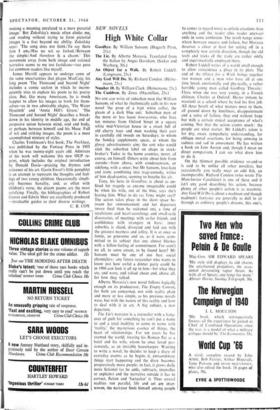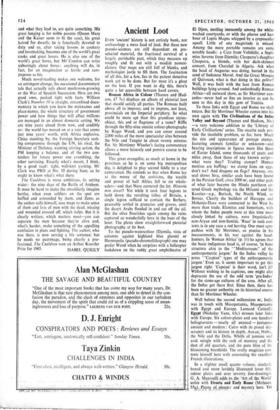Goodbye. By William Sansom. (Hogarth Press, 21s.)
NEW NOVELS
High White Collar
The Lie. By Alberto Moravia. Translated from the Italian by Angus Davidson. (Seeker and Warburg, 30s.) An Object for a Walk. By Robert Liddell. (Longmans, 25s.) Any God Will Do. By Richard Condon. (Heine- mann, 25s.) Number 10. By William Clark. (Heinemann, 21s.) The Cauldron. By Zeno. (Macmillan, 25s.)
No ONE can write of suburban man like William Sansom, of what he rhythmically calls in his new novel 'the prop of a high white collar, the gleam of a dark blue suit.' Suburban man of the more or less haute bourgeoisie, who lives ten minutes from Oxford Street in a square white mid-Victorian house in a street full of old cherry trees and men washing their cars in carefully old tweeds on Saturdays; to whom the Sunday supplements speak, at whom the glossy advertisements aim; the sort who would stick the suburban label on chaps in stock- broker's Tudor in the home counties, never, of course, on himself. Others write about him from outside—from above, with condescension, or sidelong, with a sneer; but Mr Sansom, love-hate and irony combining into tragi-comedy, writes of him dead-centre, seeming to breathe his air.
Tony, his hero in Goodbye, is about as un- fitted for tragedy as anyone imaginable could be when his wife, out of the blue, says she's leaving him. What to do (as Tony might say)? The action takes place in the short space be- tween her announcement and her departure (more final than he reckoned on), a time of revelations and heart-searchings and small-scale discoveries, of meetings with so-far friends and confidences with strangers in bars: inner suburbia is sliced, dissected and laid out with the greatest neatness and jollity. It is at once so funny, so gruesome and so, as it were, com- mitted to its subject that one almost blushes with a fellow-feeling of commitment. For aren't we all, to some extent, to be found here? Mr Sansom must be one of our best social chroniclers: any future researcher who wants to know just how awful a dinner party could be in 1966 can look it all up in him—for what they ate, and wore, and talked about and, above all, for how they talked.
Alberto Moravia's new novel follows logically enough on its predecessor, The Empty Canvas, for both are concerned, not with reality plain and more or less simple, as his previous novels were, but with the nature of this reality and how to deal with it in art. A big subject, a new departure.
The Lie's narrator is a journalist with a hang- over of guilt for something he can't put a name to and a total inability to come to terms with 'reality,' the mysterious essence of things, the heart of relationships. For ten years he has roamed the world, treating his Roman flat as a hotel and his wife, whom he once loved pas- sionately, as an invisible housekeeper. Wanting to write a novel, he decides to keep a diary of everyday events; as he begins it, extraordinary things start happening and the diary becomes progressively more purple; in fact, it grows daily more fictional (as he adds, subtracts, intensifies or explains) and the narrative outside it has to correct, flatten and 'factualise' it. Thus several realities run parallel, life and art are inter- woven, the narrator finds himself among people
he comes to regard more as artistic creations than anything and the reader (this reader anyway) ends in some confusion. The result hangs some- where between success and failure, but Moravia deserves a cheer at least for setting off in a completely new artistic direction, though the old tools and tricks of the trade are rather oddly and experimentally employed there.
Robert Liddell writes of a world small enough to allow coincidence a place in its plots. The end of An Object for a Walk brings together two women and a man who have all at one time loved, emotionally and physically, a rather horrible young man called Geoffrey Thwaite: Flora when she was very young, in a French château; Charles at Oxford; Hester (whom he married) at a school where he had his first job. All three bereft of what matters most to them, all ground down by loneliness, disappointment and a sense of failure, they end without hope but with a certain stoical acceptance of what's coming. Not that the action counts much: the people are what matter. Mr Liddell's talent is for dry, exact, sympathetic understanding, for oblique moral assertions, for being amusing in sadness and sad in amusement. He has written a book on Jane Austen and, though I mean no direct comparison, I can see what drew him to do it.
On the thinnest possible evidence so-and-so is said to be unlike all other novelists, but occasionally you really meet an odd fish, an incomparable. Richard Condon (who wrote The Manchurian Candidate) is one of these and it isn't any good describing his action, because plenty of other people's action is as eccentric. Any God Will Do is about a madman and though madmen's fantasies are generally as dull to sit through as ordinary people's dreams, this one's, and what they lead to, are quite something. His great longing is for noble parents (Queen Mary and the Kaiser seem to fit the case), his great hatred for dwarfs; he is fanatically devoted to duty and so, after taking lessons in cookery and lovemaking, becomes one of the world's great cooks and great lovers. He is also one of the world's great bores, but Me Condon can write unboringly about bores : anything will do, in fact, for an imagination as fertile and ram- pageous as his.
Much novel-reading makes one welcome, for an astringent change, the occasional documentary tale that actually tells about mushroom-growing or the War of Spanish Succession. Here are two good ones, packed tight with facts. William Clark's Number 10 is straight, streamlined docu- mentary in which you learn the nicknames and place-names, the whole structure of government power and how things that will affect millions are managed in an almost domestic setting. We are nine years ahead from now, and credibly so : the world has moved on at a rate that seems just nine years' worth, with Africa explosive, China standing by, the Foreign Secretary seek- ing compromise through the UN, his rival, the Minister of Defence, wanting stirring action, the PM keeping a balance, and of the two con- tenders for future power one crumbling, the other surviving. Exactly what's meant, I think, by a good read: tight, well-knit yarning. Mr Clark was PRO at No. 10 during Suez, so he ought to know what's what there.
The Cauldron is more ambitious, its setting wider: the nine days of the Battle of Arnhem. It must be hard to make the unsoldierly imagine battles, when even soldiers on the spot are baffled and astounded by them, and Zeno, as the author calls himself, uses maps to make sense of them and lists of men with the dead, missing and wounded crossed off, which helps. But it is clearly written, which matters most—you can separate the men because they're alive and, what's harder, make something of the appalling confusion in plans and fighting. The author, who was there, is now serving a life sentence; but he needs no patronage, being clearly a pro- fessional. The Cauldron won an Arthur Koestler



































 Previous page
Previous page